#some of you need to know that exclusion is very nuanced and can be both a good and bad thing depending on how it’s being used
Explore tagged Tumblr posts
Text
Going to treat this as a genuine, well intentioned question, even though Im not sure it is. A few points:
Edit for credentials notice: I studied Talmud in school from 7th-11th grade, and have only learned a handful of sections. What I said is based entirely of my understanding of how the Talmud applies to Rabbinic Judaism, which is based on what I learned when learning Talmud. It is possible some details will be simplified or lack important nuance. If you find something important I left out or got wrong, PLEASE let me know so I can correct it!
1.) The Talmud is much less well known as a scripture. The Torah, along with select portions of Naviim and Ketuvim are well known because Christianity uses or references them. The Talmud is exclusive to Judaism, and has no easy parallel in Christianity that people can point to and say "oh, its the Jewish version of X" like people treat the Quaran as the Muslim bible (not a view I approve of, but it very much shapes public awareness)
2.) The Talmud is not doctrine, it is a collection of machlokets (arguments, dialogues). I generally take umbridge with a lot of "criticism of X religious text" since most of the time it only covers the text as doctrine and ignores interpretation, this aplies all the moreso with the Talmud, since, unlike the Torah, where there is argument to be made that the surface level understanding is an important part of interpretation, the Talmud is literally impossible to do that with, since it's primarily composed of disagreements. The general format of a section of Talmud goes a) statement, usually a quote from the mishnah (eg, the morning prayer can be said when you can distinguish between two colors of wool) b) a Rabbi or the Talmud asks a clarifying question (eg, does this mean two separate pieces or a clump with both colors?) c) a resolution is given d) a Rabbi or the Talmud asks a challenge question (eg, I found a source elsewhere that says we shouldnt be using wool colors as a timing measure at all, here is my logic, here is my alternate, what do you think of them apples) e) a resolution is given (eg, these two timing factors are simultaneous, or we follow the option of Rabbi X). And there are hundred of these per sefer. Reading the Talmud tells you how to do Rabbinic thinking, and SOMETIMES gives resolutions on Halachic debates, but its primary purpose isnt to tell you how to lead your life
3.) The Talmud is read with commentary. Half of the time, the arguments alone wont make sense to an outside reader, since these were between Rabbis well versed in Torah, Mishnah, Beraita, and Talmudic logic. As such, every Talmud comes with commentary to break it down, and many of those commentaries have commentaries, and then there are commentaries about how does this actually even apply to us, and at a certain point unless you are fluent in Hebrew AND have a well versed teacher to guide you, getting the full complete understanding is difficult. Yes, you can get the jist from just reading with the Rashi and Tosafot, which usually do have fairly good English translations, but if your goal is to understand it, not just as a standalone text but as the foundation of Rabbinic Judaism, you need to understand how Rabbis interpreted it, and that means reading a variety of commentaries
4.) Criticism of the Talmud does exist, just generally not in good faith. Famously, King Louis IX used one such incident to have 10,000 copies burned. But it also exists in the modern world as well, and its disingenuous to say otherwise
5.) Given all this, what would a good faith criticism of the Talmud look like? I can only see 4 avenues, but if anyone has more feel free to add:
a) disagreement with a specific outcome or peice of logic in a specific situation. This is common, and requires fluency with Talmudic logic and a source. Generally, if you can provide a better source and the logic to prove its accplicability than what is there, you can be taken seriously. This is also like. What the Talmud does. So its not exactly an argument AGAINST the Talmud
b) argument that the Talmud is heretical to your religion, and that your religion takes priority over Judaism. This requires some knowledge of the Talmud, a claim to heresy, and being a jackass. This happened a lot throughout Christian Europe, almost exclusively in bad faith, but probably could in theory be done in good faith, as good faith as can be given to a religious supremacist
c) an argument against Talmudic logic. Ive been saying Talmudic logic, thats because Talmudic interpretation relies on media analysis, using methods which are not thought of as applicable in Western logic (probably the easiest example to point to is juxtaposition, which can often be used, when understood properly, to draw meanings not directly in the text, much moreso than is considered reasonable within Western media analysis). If you understand all the rules of both HOW and WHY Talmudic logic is the way it is, and think it is not applicable to understanding the Torah and Mishna, go ahead, I guess.
d) an argument against the applicability of the Talmud to modern Judaism. If you want to make this argument about your own Judiasm, fine, I dont really think people will care that much if you do that, unless the people around you are judgey. Plenty of Jews live their lives entirely unrelated to what is in the Talmud. If you want to make that argument about Judaism as a whole...that requires the lifes work of several scholars, and would almost certainly create a massive schism if it caught on. Even though the Talmud does not have the final say in Judaism, it is still the basis of Rabbinic Judaism.
6.) This is my perosnal opinion, but maybe we shouldn't be criticizing religious texts, especially if they are not applicable to us? Its asshole behavior. Besides, as I said above, the text alone gives very little information on what people of the religion actually believe, how they interpret the text, or how they live their lives. As someone who has read bits and pieces of several religious texts, my first thought has never been "lemme disprove that or show why its problematic" its usually been "huh thats interesting but I have no idea where that comes from, next time Im having a discussion with someone who knows more about this Ill bring it up to see if I can find out more." Besides, its not applicable to me, so Ill never understand it with the same depth as someone for whom it is, so why should it be my place to butt in and argue against it?
PS, this has nothing to do with skin color or Israel, I have a feeling the way the question was worded implies "look, the Jew texts are considered beyond criticism, thats suspicious, it probably has something to do with Israeli influence. This feeds from the "Jews control the world" conspiracy. If that wasnt what you intended Im sorry, I hope my response gave you the information you were looking for, I would ask you reconsider your wording in the future.
Hope this helps!
Can someone tell me why there isn't much mainstream criticism of the Talmud, despite the fact it should really be open to scrutiny like any other religious book.
It's bizzare when you consider how many white people follow the religion, though I suppose Israel's just a secular project anyways.
37 notes
·
View notes
Text
from all the vikdecai analysis/commentary i have read, i find this commonality: what i know of vikdecai has strictly been through the eyes of mordecai and mordecai alone. which is so strange because, i mean it takes two to tango and there’s another party people seem to overlook. VIKTOR HIMSELF!!!
like yes, i believe as a raging aro that viktor is not one for romance either. i just think he lacks that attraction and vikdecai is very far from that cookie cutter relationship type beat (idk what the hell i just said but you catch my wave)
it’s funny because, vikdecai has been the only ship (so far, in my eyes at least) that captures how i perceive love. i personally like calling it schrodinger’s romance: it’s both there and not there. moreso because i see their connection being so deep that it does not exist beyond the both of them. it is something that only they exclusively share with one another.
and i think this holds more truth with viktor’s side of the whole ordeal. while one may read it as unrequited on mordecai’s part— i see it as, YALL DONT GET VIKTOR THE WAY I DO /J
okay i kid. but really, i do think he cares. just not in a way that’s easily digestible or distinguishable in the naked eye. but i think i need to stick my thoughts back in the oven to cook a bit longer because it’s truly flying all over the place and some bits of the dish is missing— but i promise i will get to the bottom of it!!
look as much as i love vikdecai, i find it hard to visualise them in a lovey dovey, “let’s have breakfast in bed every morning” setting. but that’s also why they’re so special to me. it’s special to me how they can hold a conversation without any words being said. it’s also very special to me that, despite viktor being a walking accumulation of everything mordecai hates, mordecai still holds him in high regard.
not to highbrow/lowbrow the act of shipping two fictional characters but vikdecai is a very nuanced case and it definitely is an acquired taste— i can see why they’re not many people’s cup of tea. only one can say love is forcibly threatening your ex partner into retiring through the act of kneecapping but hey, that’s the vikdecai way baby!!!!
#if you guys have thoughts on viktor in vikdecai pls TELL ME#aro viktor is the only reason why i live lets be real#i live and breathe off of that shit#viktor vasko#mordecai heller#vikdecai#lackadaisy#lackadaisy cats#xan: rambling#xan: vikdecai insanity
54 notes
·
View notes
Text
Today I'd like to talk about the mistakes the writers made with my favorite 3h lord is Claude, specifically houses Claude. they've done a lot right with his character but that doesn't mean he isn't without his unfortunate flaws.
Lets begin with Almyra and how Claude sees the situation between them and Fodlan.
Almyra is poorly utilized and done dirty by making them war loving barbarians for the sake of it and causing everyone and themselves grief due to their unnatural love for war. And on top of that they made Claude uncharacteristically dumb by blaming Fodlan and Rhea for Almyra's consuquences despite being smart enough to know that Edelgard is the aggressor in part 2.
This could've been easily avoided by making either the 10 elites or the Agarthans responsible for the fued between Almyra and Fodlan.
Next is his view on Rhea and Edelgard. I talked about this before but to sum it up he distrusts Rhea that she can't be reasoned with to the point that he believes that change can only happen if she's gone, all because he blames Rhea for Fodlans throat and yet a violent war monger like Edelgard who endangered his friends during white clouds and works with the Agarthans is granted patience, a chance of mercy, cooperation and the benefit of the doubt.
What makes this even worse is that Claude distrusts Rhea for the wrong reasons. Things like her allowing Fodlan to oppress, conquer and kill foreign nations like they did with Duscur and Brigid are extremely valid reasons to distrust her. The solution to that issue is properly criticising both characters.
The next problem is that he's great pals with Hilda, who's family enslaved an Almyran child and subjected him to extreme labour with no rest and some bread every few days. The ever so simple fix is cutting that slavery junk out. It doesn't get addressed as it should've, only exists to prop up Rhea as a white saviour and Cyril is the brown servant. Just get it it out of here.
And last and certainly not least his support with Ingrid not addressing her unjustified racism and hypocrisy in condeming all people of Duscur for the actions of a few while simultaneously giving Faerghus a free pass for their worse crimes. That could be solved by either A. Cutting her selective racism out ( cause again, it only exists to prop up white characters, isn't handled properly, you don't need extreme racism to have depth, nuance and conflicts and nothing would be missed if it was cut out ) or B. At the very least harshly condemn Ingrid for her repulsive behaviour.
Barring the first issue the selective treatment of similar characters, the needless and extreme racism that purely exists to prop up white characters and not taking the oppression and mistreatment of Duscur and Brigid seriously are issues that plague the entire game and not just Claude.
But that's it for my criticism. Like i said Claude is my favorite lord but that doesn't mean that I'm gonna deny the faults. Liking your favorite character and bring critical about them isn't mutually exclusive.
49 notes
·
View notes
Text
So I've finally read How Do We Relationship? by Tamifull
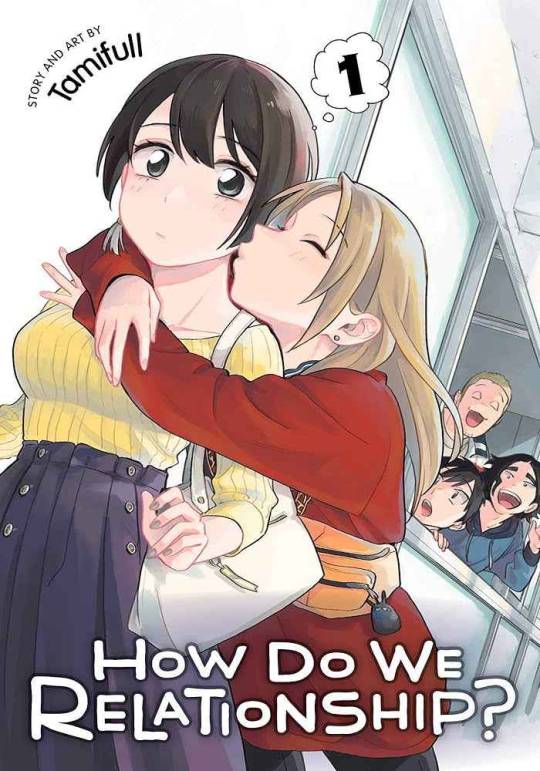
(spoilers for up to chapter 121 ahead)
What exactly is a relationship? Is it some natural part of the human experience where you pick a life partner? is it a social contract between individuals to ensure exclusive romantic and sexual feelings between each other? Is sex a requirement for a relationship? Is romance even?
I don't know to be honest. What I do know is this: How Do We Relationship? by Tamifull hit me like a truck and then backed up over the corpse.
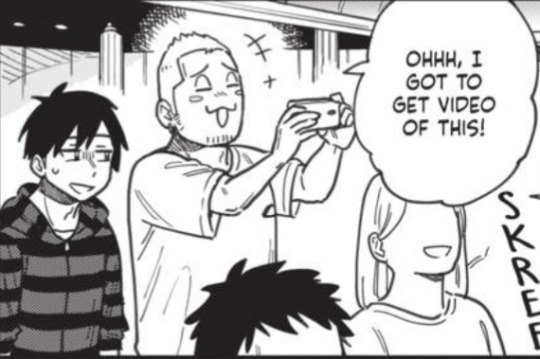
It might be one of the most nuanced, unflinching and uncompromising works about understanding relationships I've read. I think, in general, a lot of romance fiction feels overly wishful. While I can certainly appreciate a good gushy and feel good romance, it kinda gets tiresome seeing the same "will they, won't they (they will eventually)" and "love at first sight (it works out even though they literally have no chemistry)" stories regurgitated over and over again.
So much of it just feels too fake for me. Like I'm not watching two characters come to understand and fall for each other, I'm watching two halves of a couple who only exist to be a couple. Chemistry? Completely optional! Hardships? Temporary and will only make them love each other more afterwards. Break ups? Reserved exclusively as a failure state or for purely abusive relationships…
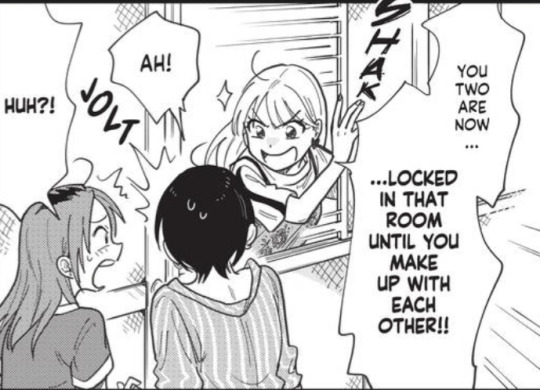
What sets How Do We Relationship? apart from its peers is its commitment to understanding its characters as people rather than archetypes. People who each have their own wants, fears, feelings towards sex and romance and most importantly: their own personal definition of what a relationship should be. People who when confronted with each other think they understand how everything should go, only to find out that the other person has a completely different understanding that doesn't fully jive with theirs.
The only yuri series I can think of that does something similar is Yuri is My Job! by Miman. Yuri is My Job! focuses heavily on the idea of fake relationships in Class S stories with it frequently asking "what actually makes something a relationship?"
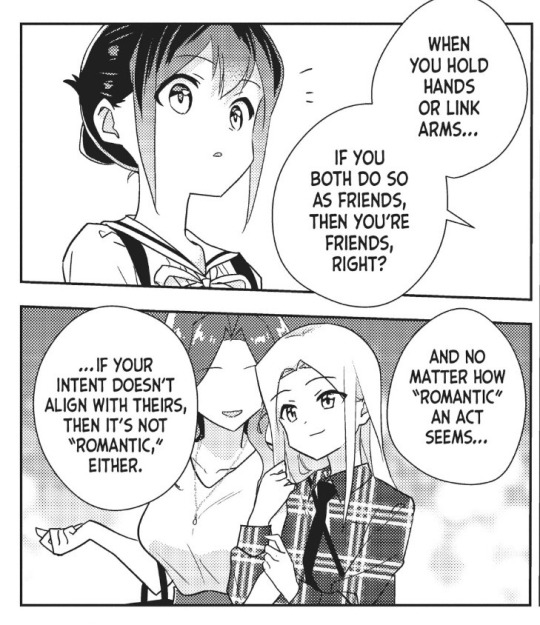
A lot of Yuri is My Job! is primarily a critique on Class S stories first (possibly also a direct refutation of Maria Watches Over Us… I still need to watch MariMite so I can't say for certain) with a lot of its characters being subversions of classic Class S archetypes. So a lot of its dissections of relationships are done in the context of Class S stories.
That being said, seeing a series directly refuting the idea of a relationship being static and instead coming to the conclusion that the only ones that can decide what a relationship is are the people involved? That stuck with me. How Do We Relationship? is far a more focused dissection of what it means to be in a relationship, or at least, what means for its particularly cast of characters.
Take, for instances, our two main characters: Miwa and Saeko

Miwa and Saeko start out as friends, but after coming out to each other and finding out they're both lesbians, they decide on a whim to date. At first glance, they seem like the perfect couple! After all, they bounce off of each other's personalities really well, enjoy each other's company (both out and about and in the bedroom) and in general seem to care for each other quite deeply. They were made for each other, right? Well, no.
They're both individuals with vastly different personalities, experiences and feelings from each other. Over time they begin to see things in their relationship that bother them. Mostly little things here and there. Nothing they want to start a fight over or strain their relationship over at first but… Small wounds still fester. It eventually finally comes to a head a little bit after Miwa visits her old crush in a high school reunion. It's very clear to both Saeko and Miwa that she hasn't actually gotten over her past feelings for her high school crush. What's more clear to Saeko is that Miwa doesn't feel the same level of love for her and she does for Miwa. Eventually they just… break up and go back to being friends.

In most romance stories, a break up is regularly seen as either the ultimate failure state for a relationship, a temporary set back for a relationship to overcome or purely as an escape valve from an abusive or just kind of shit relationship. The reality is that there many different reasons for a relationship to end.
Could Miwa and Saeko have worked it out? With the path they were heading down, no. Neither of them were willing to fully open up about their problems as both feared hurting the other. Which just ended up with them hurting each other even more. If they had continued the course, their break up might have been far more painful and resulted in them not being able to be friends any more.
And they do get to go back to being friends even after being exes!
I think back to my aunt who divorced her husband several decades ago. They ended their relationship but decided to remain close in part for their daughter's benefit. Over the years they've remained close friends and have gone back to living with each other as well. There's no hard rule that becoming exes means you have to fully cut each other off if that's not what you both want. Certainly there might still be mixed feelings between you both (Miwa and Saeko's relationship as friends certainly takes some huge bumps after they break up), but you shouldn't follow along with what society expects from you both in a relationship versus what you both want from YOUR relationship.
And that right there is Tamifull's thesis statement with How Do We Relationship?: don't determine how your life and relationships should be based on what society expects them to be.

Tamifull doesn't hold back anything when it comes to depicting how society treats relationships in general but also how it treats gay people in specific. While the physical danger of homophobia is always a constant that makes many queer people not want to be open with their queerness, being constantly other-ed in most social situations (whether intentionally or not) can frequently be reason enough to want to stay in the closet. Insensitive questions (that are more often born from ignorance rather than malice), being always seen as an outlier, frequently having to lie about who you like and a million other microaggressions that just build up as extra hardship in a queer relationships. Relationships are already not easy to keep together, but adding additional outside stressors can strain them even harder. Enter Shiho.
Shiho was Miwa's aforementioned high school crush whom she reconnected with during a high school reunion. After Miwa and Saeko's break up, Miwa started keeping up contact with her more and more and eventually has the opportunity to meet with her again. Miwa goes to meet with Shiho in order to confess her past feelings for her. Miwa is fully expecting to get turned down but when she meets Shiho, Shiho seems far more receptive and warm towards Miwa than she was expecting. Whatever mental protections Miwa had against the idea of actually having her feelings reciprocated crumbled as it seems like Shiho might have feelings for her as well? Could she actually get together with her old crush?

Unfortunately, while Shiho does have feelings for Miwa, she doesn't feel strong enough to deal with all the baggage that comes with being in a lesbian relationship with Miwa. She very clearly put a lot of thought into the subject, and while she does care for Miwa, she just can't put herself in a relationship with Miwa. Shiho isn't in the wrong about her own feelings and she doesn't invalidate Miwa's. But it still ends up breaking Miwa far more than if Shiho had out right rejected her.
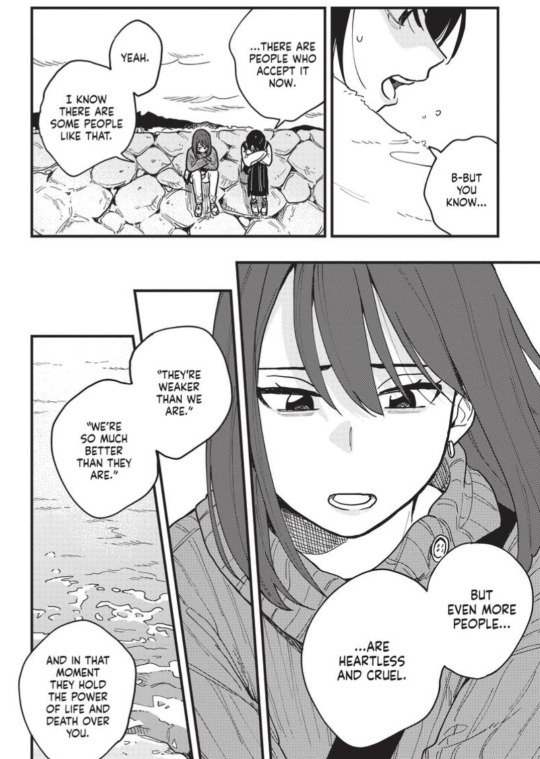
External factors can have a major effect on relationships but internal factors have arguably far more impact on relationships. Namely: sex and romance. Or more specifically: how everyone has different levels of interest in sex and romance.
Figuring out that I was ace and aro took way longer than it probably should have. "I have no interest in having sex with someone but I still get off to porn so clearly I can't be ace!" was legitimately a thought that stopped me from fully embracing being ace for several years. Eventually I figured out that sex-repulsion isn't a requirement of being ace and that the ace spectrum covers a pretty wide variety of experiences under it and that my own is just as valid as the others.
Over the years I've had to engrave a pretty simple idea into my soul: there is no universal experience when it comes to sex and love. Regardless of whether you're allo, ace or aro, you'll have very different feelings towards sexual and romantic interest than everyone else. Let's take, for example, Rika.

Rika is one of the supporting straight characters of the cast. She's also arguably the most sexually active member of the main cast with easily the highest body count of them all. And yet she does not want a relationship past friends-with-benefits. I'm not sure if she's necessarily aro or just not currently interested in a romantic relationship, but the point is that the main thing she wants from her relationships is sex. And that is completely fine! It sucks that when she explains this to dudes she just fucked who want to start dating her that she only wanted a sexual relationship with them and they respond by thinking she must have some family issues that make her so sexually active (she doesn't) or they respond derogatorily that she's just a slut. That's just part of who she is, there is nothing wrong with her. If she was a guy, it wouldn't even raise an eyebrow.
And then on the flip side, you have Tamaki.
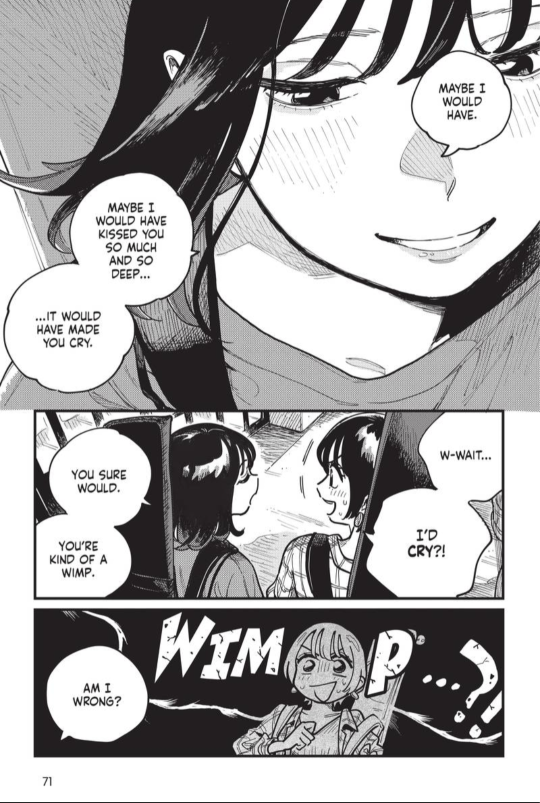
Some time after Miwa recovered from her heartbreak over Shiho (and after being sex friends with Saeko again for a bit), Miwa starts dating a year younger kouhai by the name of Tamaki. Tamaki is asexual/alloromantic, she very much has romantic feelings for Miwa and even enjoys kissing and looking at Miwa's body, but she has a very low sex drive. Miwa, on the other hand, has a pretty high sex drive. Tamaki and Miwa together might be one of the best depictions of an allosexual and asexual relationship I've ever seen.
I've know a number of aspecs who've gone through a similar situation as Miwa and Tamaki. Some are certainly able to come to an understanding with their allo partners about each other sexuality, personal boundaries and fulfilling each other's needs in a way that's healthy for both parties. But a lot end up in similar situations as Miwa and Tamaki.
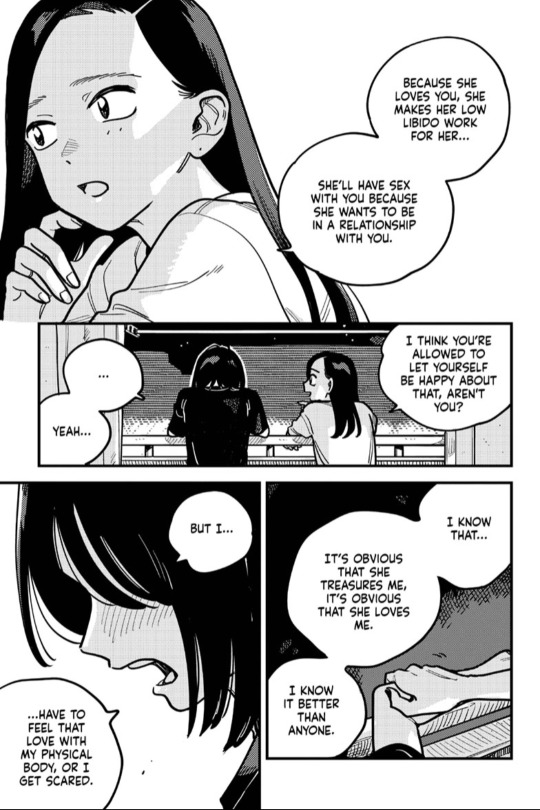
Where in one or both partners feel like they're hurting each other. Some aces feel guilt over not being able to provide for their partner's sexual needs, even if their allo partner assures that them feeling comfortable is far more important to them. Some allos might feel like they're raping their ace partners when they have sex, even if their ace partner expressly gives consent because they want satisfy their partner's needs, even if they themselves don't get anything out of the experience. If you get both together, you end up with a feedback loop of self hatred where the ace person sees their own lack sexual interest as actively harming the person they love and the allo person sees themselves as a monster for wanting to have sex with the person they love.
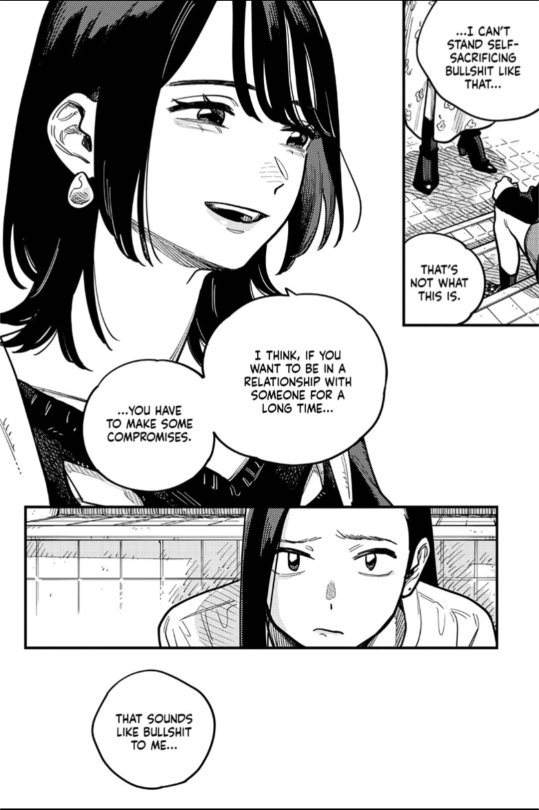
It's a toxic situation to be in, but it's also one that's hard to leave as both parties feel they themselves are in the wrong and their solutions to correct their error (the allo refraining from asking for sex and the ace more freely offering up sex) just lead to the situation escalating to the point of serious damage to one or both parties.
And unfortunately, that seems to have happened to Miwa. As of writing this, we're at chapter 121 so we're still early on the current arc, but it's looking like Miwa breaking up with Tamaki has done a number on her sex drive. I'm no expert on fluctuations in sexual interest due to trauma, so I won't dive too deeply into this (especially since we're still so early in the new arc). However, associating your sex drive as something that's actively harming your partner to the point that you leave them even though you still love them? Yeah, that's going to cause some damage.
I could ramble on and on about other aspects and topics that How Do We Relationship? does so well (Yuria/Saeko insecurities and dependencies, Saeko/Miwa's brief stint as friends-with-benefits, etc), but I've already said far, far more then I was originally already planning to say. So I think I might have save them for some future posts if I remember them.
So to finally end this now very long essay, I return to my original question: "what exactly is a relationship?"

I don't know, I ain't a cop. Whatever you and your partner(s) say it is, is what it is. But watch out though!
#how do we relationship#how do we relationship?#tsukiatte agetemo iikana#this was originally just suppose to be a quick little “hehe I read this and here are my thoughts” but then How Do We Relationship changed m#I didn't want to turn it into some kind of essay i swear!#the next person to place blame solely on tamaki for how their relationship ended is getting their head replaced with a rock#the next person to infantilize miwa instead of recognizing her as an actual person who makes her own decisions also gets a rock for a head#if you call saeko a red flag you also get a rock for a head#i've got plenty of rocks for everyone#unrelated but I was watching Noah Caldwell-Gervais' video on RAGE before writing this so I had his voice in my head narrating my script#it was surreal tbh...
71 notes
·
View notes
Text
@edennill I was thinking more about what you said about Valarin grammar, and of course you were very right!
Of course it would be very irregular, because complexity of meaning.
The relationship between "see" and "have seen" is maybe same enough as "hear" and "have heard", but very different from, say, "forge" and "have forged". They'd have a lot of tenses, some existing only for one or a few verbs. The elven scholars would group them into larger groups like "past simple", "past perfect" etc just with irregular forms, but the Ainur would say "No! No! those are different!"
And for other verb grammar it's even stranger: there would be no clear table of [person x number x maybe gender x honorific? x tense x...]
Sure, for some there would be. The categories that incarnates have would mostly have the table structure (person x genders x number x tense), but surely there are future tenses that Elves can do and Men can't (...let's not even begin on all the more transcendental tenses, but Men also have a tense of "finished for good" that's likely never used for Elves, but maybe Feanor...).
But most of the language is less regular-ish:
There is a number/gender for a married couple as a whole in particular.
Each Vala has their separate honorific, because each has such a different relationship with their Maiar. Of course you can't have those forms in plural, or, for example, Aulë's honorific verb forms in feminine grammatical gender.
Inclusive "we", exclusive "we", "I'd love you to be included if you want"-"we",… A ton of them. And the uncertain/wishful forms are obviously only for future tenses, because in the past it's either inclusive, exclusive, or probably "You too, but in a different way" and some others… [the XKCD geologists post came to my mind]
And many, many other things like this. And don't even get me started on the stranger parts.
And I still (even more than before) hold to the HC that Mairon wanted to make it regular at some point.
But now it's clear to me that it was late, it was when he was already falling. Because when you have a language that's irregular and complex to match the complexities of it all, and someone wants to force it into tables, and that's bad... Oh, it fits so well! It fits with Tolkien's attitude of "who pulls a thing apart in order to understand it, is dumb".
He would try to do hyper-regular grammar in Black Speech.
And I agree, Fefe learned to use the more normal parts well.
Fingolfin just spoke Quenya, not willing to do another thing in which he was inferior to his (half!) brother. Finarfin learned to use the normal parts not as well as Feanor, but still well, and then ignored it for most of the time anyway, and just said things in whichever way felt right, resulting in a (rock-opera-style) wild mix of brilliant ideas (that reinforced the Valar's belief that the Elves know things well and need no explanations) and absolute trash (mostly politely ignored).
BTW you'd think, maybe, that it was like: Manwë made the words for air-related things, Ulmo for water etc, but no. Everyone else made words for various kinds of wind and Manwë was like "But those two are very different, you can't out them in the same category!" and similarly for the other Valar.
The more someone knows a thing, the more difficult it is to put it into categories— no, that's not fully true, either. Categories and words do have merit, because they allow for narratives and parables and literary devices and many things like that.
But also, language is a simplification of the world, not the world itself, so the closer someone is to comprehending a part of the word, the less language-based it would be, or at least the more nuanced and bigger the language, I think.
Somehow, those both are true.
…still, I do think that Manwë complained about doubted the words for winds, and Ulmo for various water phenomenons.
#silm#silmarillion#the silmarillion#the silm#Tolkien legendarium#Tolkien languages#valarin#silm hc#sauron#mairon#feanor#fingolfin#finarfin
18 notes
·
View notes
Text
The Tragic Fall and Potential Redemption of Caitlyn and Jinx
Disclaimers
I really like both of these characters. I think they are both very nuanced and really well written: neither one is completely good or evil, This is not an attack on either of them or those of us who like either/both of them, I’m just discussing their character flaws and their actions at some of the lowest points in their lives.
As an older sister, I probably hold undue sympathy for Jinx, so please keep that in mind when you read this and if you find anything that I overlooked or unfairly glossed over, please let me know!!
I almost exclusively watch animated fantasy kids shows, so my views on fictional characters’ morality has been shaped by that genre.
Now with that out of the way, onto the actual content:
Jinx and Caitlyn’s arcs are quite similar, sharing many of the same major beats: after tragically and traumatically losing a parental figure, they fall into the hands of a powerful and manipulative mentor/parental figure and go on to do horrible things, with Jinx spreading Silco’s shimmer to the citizens of the Undercity and Caitlyn adopting Ambessa’s ruthless tactics in the name of protecting Piltover. However, despite their nearly identical arcs, I have vastly different opinions on what their potential redemption arcs should look like due to a few key differences in their stories and characters.
For starters, Jinx was very young when she lost Vander and fell into Silco’s hands. She was never able to establish a stable identity for herself in her formative preteen and teenage years (until Season 2, which I’ll get to later), as shown by her two different names, how she can’t let Powder drown, and how her hallucinations get worse and more overwhelming every time she’s reminded of her past self. She also wasn’t as invested in Silco’s plans as she was in receiving his praise and affection, which we can see by how she constantly seeks physical affection and words of encouragement from Silco but is also completely willing to disobey him, diverge from his plans, jeopardize his missions and jump ship the moment she finds out that Vi’s alive. This shows how much Silco has corrupted her core motivation of wanting to help people, which we know from the sheer number of times she says some variation of “I want to help” in Act 1 of Season 1, and how everyone always comments on how selfless and helpful she is in the alternate universe.
Meanwhile, Caitlyn was in her early-mid twenties when she fell into Ambessa’s web, and had already formed a stable, if not fully formed, sense of self and purpose. She wants to actively do good and improve the world around her, as evidenced by her decision to break away from politics which and join the enforcers and her subsequent exhaustive efforts to find and dismantle an crime organization, which was then corrupted by Ambessa who got her to seize power and ruthlessly crack down on the Jinxers and crime in the Zaun.
So, what does this mean for their possible redemption arcs?
Because Jinx was very much not her own person until Season 2 and a child for most of her time working for Silco, I believe that all Jinx needs to live a happy, peaceful life is to have some healthy support systems/coping mechanisms and her own sense of self as she does in the alternate universe. And we see in Season 2 how much of a better person she can be with simply the absence of a toxic familial environment: she cares for Isha, rescues many Zaunites from inhumane treatment following their dubiously justified arrests, takes the lead in healing her relationship with Sevika and Vi and then leading the Firelights and other Zaunites to fight for Piltover against Noxus, and I believe she can do so much more good and 100% deserves a chance at a new life with a fresh start.
That’s not to say that Jinx didn’t do bad things and didn’t seriously hurt people. She has been implied to have killed many people and helped get Zaun addicted to shimmer. However, she was a child and dependent on Silco for survival and whatever scraps of sanity she could find. She also knew she was more or less replaceable, which we can see when she was afraid of appearing weak and then stole the hex tech crystal to prove her worth to Silco, and if she left, Silco and a bunch of other Zaunites would have tried to hunt her down. Simply put, she had relatively no power to not go along with Silco and even if she did, Silco would have achieved very similar results regardless. And I do believe that in most cases, children, especially those with mental illnesses, and/or toxic/abusive parental figures, deserve a fresh start and a clean slate when they are able to develop their own identity, ideals and world view, so I really can’t fully blame Jinx for what she did prior to the Season 1 finale. And then, after the dinner scene, I don’t believe she does anything bad enough to disqualify her from redemption: if I remember correctly all she did was try to kill Vi and the task force who were hunting her, kill the three goons who were after Isha who were implied to have enslaved her to work in the mines, and then fire her rocket at the council to start a revolution for independence, which I think is completely justifiable since the under-city had largely been supportive of a revolution since she was a child and a decapitating strike is the quickest and least bloody way to end a war and she only really ended up killing three people who were oppressing them. That just leaves the kidnapping of Vi and Caitlyn and the murder of Silco that she should make amends for, but since Vi never really held it against her and killing Silco was arguably a net positive for both Zaun and Piltover, the only thing that she owes is an apology for Caitlyn, but I don’t think that that’s enough to make her irredeemable.
Caitlyn’s redemption would be a bit more involved since she had a lot of power, and with it, the responsibility to not abuse it. However, she personally used chemical weapons against anyone suspected to have ties to Silco or Jinx, didn’t honor the plea bargains she offered, allowed Noxian troops to arrest and torture anyone with blue hair on the grounds they were affiliated with Jinx, and threatened prisoners with the most inhumane conditions in Stillwater should they not cooperate. Under normal circumstances, that would be an unforgivable breach of power, however, Caitlyn’s circumstances were anything but normal. She had just lost her mother in an unexpected attack on Piltover’s Council which did warrant some sort of response, she was being manipulated by a Noxian mastermind on top of being relatively young and new to politics. All things considered, it could have gone a lot worse which is why I think that Caitlyn deserves the opportunity to make things right.
What I think redemption could look like for Caitlyn is: reforming the justice system and Stillwater, compensating the Jinxers she arrested and the Zaunites who fought with her against Noxus, leading the reconstruction of Zaun and putting it on as equal footing with Piltover as possible (which we do see start to happen), install adequate air and water filtration in Zaun, create government programs and fund community organizations to help people quit Shimmer, research ways to help people heal from the long term affects of shimmer and resign from her role as Commander. I think these actions would help heal the damage she inflicted on Zaun in her time as Commander while also working to make things better for them in the future to reduce the chance of civil war and another ruthless crackdown on Zaun.
My congratulations for making it all the way through my many many thoughts. I find morality and redemption really interesting concepts especially in fiction, and Arcane has so many good characters to discuss those topics with! So please, lmk what you think!!
#arcane#arcane season 2#arcane spoilers#jinx#jinx arcane#caitlyn kiramman#caitlyn arcane#redemption arc#piltover and zaun#silco#arcane silco#arcane ambessa#ambessa medarda
23 notes
·
View notes
Text
Okay so I've had some meta thoughts about Laurence's amnesia and how it relates to his relationship with Tharkay sitting in my drafts for like over a year now so I figured I'd finally clean it up and post it. Heads up it's really long.
Laurence finally consciously realises that he loves Tharkay (or is in love with him, whatever nuance you'd like) after "knew him, and knew himself." But at this point he's completely in pieces as a person (more on this next paragraph). Post-amnesia, he's an entirely different man. Pre-Temeraire Laurence is the harshest, strictest version both of and with himself. He follows the rules to the letter, basically takes Temeraire only out of duty in the beginning, and even keeps the promise between him and Edith despite there being no formal arrangement at all. Post-Temeraire but pre-amnesia Laurence has softened. He's putting less emphasis on the rules and more on his morals (see: treason). He has more leeway but still carries that honor/duty/order with himself.
Which is why post-amnesia Laurence is the version of himself that discovers that he loves Tharkay. In the wake of losing his memories and then regaining them he's lost and unmoored. Both of his past selves are so different and therefore so distant. They're both true but it's too jarring for him - especially in his current circumstances, much less the overall war - so Laurence becomes a new person. This is Laurence at his most vulnerable, his most unguarded, who smiles more often now because he doesn't really know that he didn't smile that much before. He has two major tethers to his personhood: Temeraire and Tharkay (I hesitate to say only tethers, simply because Laurence's life isn't that small, but repeatedly these two are the ones who have had the biggest impact on his life, who have kept him going). Obviously he loves Temeraire, he's never going to stop loving Temeraire, he just isn't capable of it, but seeing Temeraire didn't bring back his memories (I can't imagine how Temeraire must have felt, meeting a version of Laurence who had never met him). Laurence loves Temeraire in the most unconditional, selfless way - to be very Greek about it, his philia. But I think when he finally comprehends how Tharkay was the catalyst behind this radical change of his self he dives into his memories again and goes over them in excruciating detail (and he was definitely doing that already, but now he's doing it with a lens exclusively focused on Tharkay). At some point he comes to the realisation that Tharkay loves him, and that he loves him, and that he's been unconsciously shoving it down every time it's surfaced (past-Laurence was saying no homo while actively homo-ing). And with the benefit of being an new version of the same person (and also some hindsight, finally), this Laurence says, I've committed treason. My country sees me as a traitor but they still need me to serve them as a tool. I lost myself once in a war (see: "what are you doing?") that's still being fought. Time is short and there's no guarantee I won't lose my memories again, that I will still be the person I am right now. What do I have to lose?
(And on some level, this Laurence thinks, what can stop me?)
He begins giving to Tharkay what Tharkay always had given to him. His acts of devotions start small (relative to Tharkay's; transporting too many ferals is obviously a little outside of what Laurence can feasibly do). He cares for Tharkay once he wakes ("have you noticed the top of your head appears likely to come off?"), he helps him eat and drink, he massages his hands once they heal, he stays with him through the nightmares that come to haunt him. And he continues doing these little things for Tharkay, hoping that he understands (he's willing to wait, Tharkay waited for him after all, and Laurence doesn't want to push him, especially as he's healing). But I think the act that hits Tharkay like, oh, it's different this time is when Laurence bargains his freedom to Napoleon. I feel like that carries unspeakable meaning for Tharkay, who was ostracized growing up and ended up never having a "permanent" home since he travelled so much. I can't imagine that he hasn't been in a similar situation before, but he's probably always been expected to weasel his way out of it without any outside help. He's trained himself out of expecting someone to help him, to care enough about him to save him. Yet part of the man who turned to treason simply so the dragons of France wouldn't die in pain lives on in this Laurence. Pre-Temeraire Laurence is rules and post-Temeraire pre-amnesia Laurence is morals, but post-amnesia Laurence is all heart. There was never a way he was going to leave Tharkay behind.
So Tharkay starts watching him. He watches Laurence continue to devote himself to him, again and again. He brings him his coat on cold days. When it rains and their scars ache he curls around his hands and rubs lotion into them. When he goes into town he always brings Tharkay back a little gift. He starts growing vegetables in the garden and he learns how to cook non-wartime foods and how to knit (because he is a man forged by war and what does one even do during peacetime when one's dragon is busy reforming the government, anyway?) and suddenly he's providing for Tharkay like never before. He looked away for one moment and suddenly Laurence's prescence and all that he does has made the manor a home.
Yet Tharkay, for years, has told himself so many times that Laurence is off-limits, untouchable, that he can love him but that there's no chance that Laurence will love him back. The only way he can love Laurence is silently, nearly from afar, and so he tried to do that. But he can't just stand by and so every time he finds himself committing a deux ex Tharkay (see: ferals, again). He understands that there's some shit Laurence needs to learn himself (and god is this series very good about character development for Laurence) but he's not going to do nothing when the man in about to die. For him it's about caring and providing for Laurence even if he doesn't know it. He learns to content himself with the knowledge that, even if nothing comes of it, he can still be by Laurence's side.
But then the amnesia plot happens (which he only learns of after all of it goes down) and suddenly there is a half-stranger wearing the skin of the man he loves (loved, he tells himself) looking at him with those familiar blue eyes filled with a completely unfamiliar emotion. He's relieved that Laurence remembers but he's said that his Laurence is gone that he's even thinking of it like that (Tharkay has a lot of anger, both at himself and others and the world). Laurence is right in front of him, he's not gone at all, but he's gone in a way that matters. But also this new Laurence is by his side all the time. He's feeding him and helping him drink and dress and he sleeps on the floor by his bedside. Tharkay is so confused because this has to be some kind of fantasy dream he's having. He must still be in the cave (and it's believable that he is, because he returns there every night in his dreams). But he isn't and he has to struggle to come to terms with this new Laurence.
So every time Laurence does something even remotely nice he hyper-analyses it and rationalizes it to himself. He deludes himself into thinking that this is normal for Laurence now. It's normal for Laurence to fuss and hen over him now; it's normal for him to smile at him with that emotion written plainly on his face that Tharkay still hasn't (refuses) to decipher. And he does this well into post-canon.
For that reason he only gets with the program when Laurence has to leave the manor (leave home) for a long while (probably with Temeraire) and suddenly Tharkay is all alone in this huge manor. He's wearing the socks Laurence knitted for him and eating food Laurence grew and walking into rooms and seeing little parts of him scattered everywhere. There's a novel he's reading left on the table by the chair he prefers in the library. There's a cookbook in the kitchen in which he's bookmarked recipes he thinks he might like. Tharkay finds a handwritten list of things they need to buy in town left out for him. He left his pillows on Tharkay's bed because he knows he likes sleeping with a ton of pillows (and they smell like him, and Tharkay pretends he doesn't bury his face in him, that he doesn't miss him while he's gone). When Tharkay wakes up in the morning he makes two cups of tea and waits for Laurence to come in from talking with Temeraire before remembering that neither of them are here (home). He expects Laurence to appear in the evenings to ask if he wants to go on a walk through the grounds with him (and he always ends up saying yes). Tharkay learns that the manor is too big for one man who has always been a little too lonely in his life.
So until Laurence returns home he plots and plans and agonizes. After a week once Laurence has come home (and the first thing he had said to him was welcome home, and Laurence had beamed at him, and it was so unbelievably natural to say it) Tharkay begins his attempts at reciprocating. He wakes up earlier so that he can brew Laurence tea so he can take it out to sit with Temeraire. He says that he cooked some of the recipes from Laurence's cookbook and insists on making them for Laurence (he had to figure out his system of marking which recipes were Laurence's favourites). He gifts him a sturdy, functional, and beautifully crafted knife to wear around the house for daily use; he specifically makes sure the knife is up to Temeraire's standards. In fact, Tharkay talks to Temeraire about everything, and Temeraire tells him, with no minced words while completely drawing his own conclusions, that it's very nice that Tharkay is asking him for his blessing, but does he really need it at this point? Haven't they been courting long enough? He's always approved of Tharkay, because he makes Laurence happy.
That's how Tharkay realises he and Laurence have been dancing around each other like shy birds, both of them subtly showing off but not making the first move. And maybe he realises that Laurence is thinking how he used to think - that it's okay as long as he can be by his side, that he doesn't need his love reciprocated (it's a very long chain of Tharkay loving Laurence, Laurence knowing Tharkay loves him and loving him back, and Tharkay loving Laurence and knowing he knows he loves him and loves him back). And of course Tharkay wasn't going to make the first move back then, and if Laurence hasn't by now, then maybe he should borrow some of Temeraire's courage.
It's something small. The words come later, given how action-forward both Laurence and Tharkay are. They don't even need words. Maybe Tharkay takes Laurence's hand during dinner and intertwines their fingers, maybe he touches Laurence's cheek after he's braided his hair as their eyes meet in the mirror, maybe as they pack away the port and piquet he kisses him good night. Whatever it is, they look at each other and simply know. Tharkay sees Laurence slowly start to smile, a huge one that spreads across his entire face, one that he's only seen on Laurence when he thinks he's alone with Temeraire. He seems to brighten, almost radiating light.
For his part, Laurence reciprocates. He squeezes Tharkay's hand, he turns his cheek into Tharkay's touch, he pulls him in for another kiss. He watches as something seems to drop from Tharkay, something that he hadn't even known he was carrying. He becomes loose and relaxed, his body language more open as he looks at Laurence with one of his little smiles, a bit of shyness that he's never seen before evident on his face. He tells Tharkay that he's the most beautiful person he's ever seen.
#temeraire meanwhile ABSOLUTELY thought laurence and tharkay have been together since AGES ago#(maybe when tharkay brought the ferals because he thinks that that was very romantic)#he DEFINITELY thought tharkay was asking him if he could marry laurence and is now very excited to plan a wedding#i'm sorry this got so long this is like a word vomit and a half#at some point it started being less amnesia-related and being more about how willzing's love language is acts of service#this was originally part of the idea of how willzing fits into the king/knight dynamic either way you look at them that i wrote into a fic#(which is still sitting as a wip in my folders. I should finish it...)#i can't remember but at the time there was some other media i inhaled that had an amnesia plot that made me reevaluate laurence's amnesia#and how it would change him as a person and how it would impact his relationship with tharkay#anyway. i hope this finds the temeraire people <3#(was totally inspired to finish this by getting into the server lol)#temeraire#temeraire series#william laurence#tenzing tharkay#willzing#laurence/tharkay#meta
54 notes
·
View notes
Text
Oh boy, lets open that can of worms
There's a LOT of discourse with endo vs anti-endo stuff (endogenic system=plural system not formed by trauma if you don't know 🙂). Like, death threats coming from both sides kinda thing. We try to stay out of it. But it's easy to accidentally stumble into it if you're not familiar with some of the nuance. So we want to share some observations as like, a crash course. (And apparently we had a lot to say lol.)
This post isn't really to debate how plurality forms. Just to give some context as to why so much hate is flying between these two groups.
Basically, you have 2 extremes. (And everyone in between obviously)
On one side you have people making up extra rules on top of the diagnostic criteria to exclude and gatekeep anyone who doesn't meet "their level" of disordered. (I've literally heard people say "you can't be a system, you're not as traumatized as me"). A lot of accusations of faking come from this bunch. Too much internal communication? Faker. Too many non-human alters? Faker. Too many or not enough alters? Faker. You can't win with them even if you have a diagnosis.
We've noticed a lot of parallels between this group and transmeds. You need to have x level of dysphoria to ride this ride. You can't be trans if you don't want xyz treatment. You need to reach my arbitrary bar of "trans enough". Enbys and everyone else are fakers. That kind of bs.
But on this side you also have a lot of people who just want to be taken seriously. They want to be validated by their diagnosis and feel hurt when people say or do things that they think will compromise that validity. They, at least initially, come from a place of sincerity not malice. But they fall into the trap of trying to be "one of the good ones".
On the other extreme you have the wild west. Things people treat as fact aren't codified with the same scrutiny as the DSM-5 or ICD-11. This breeds its own confusion and misinformation. We've seen people conflate plurality with things like maladaptive day dreaming, lucid dreaming, adhd, and (applying it to other people with ferocity to the point of harassment) metaphors of all things.
They have a spaghetti at the wall approach that reminds me of a less extreme MOGII (an attempt to define just about every possible form of gender and sexuality). It's a messy patchwork of ideas. We've seen 8 different labels that all mean the same thing and are being used by exactly no one. Redundancy and hyperspcificity, that's the name of the game. But frankly we like this if for no other reason than we want to see what sticks, what becomes mainstream.
We've seen people from this group attack people as badly as the anti-endo group. Openly mocking people for having trauma or saying vile shit like "traumagenics kys". They feel threatened by the exclusionary nature of diagnoses. But instead of taking their frustration out on the systems of power they take them out on normal people. After all if you're diagnosed, you "represent the system"... I guess. Equally bull shit.
But this is also where the edge cases go, the exclusions, those that don't fit into a neat little box. The DSM excludes people whose plurality is accepted as part of their culture or religion. These people don't suddenly stop being systems just because they're accepted, but they're distinctly not disordered. They don't meet the clinical definition of DID or OSDD. Same goes for someone whose symptoms are mild enough to not cause "clinically significant distress". You also have people who don't want to be pathologized or have been failed by the medical system.
So lastly, a warning: When dealing with plural stuff, it's very easy to go stumbling into a mine field.
Tldr: I would always rather land on the side of letting too many people in than exclude people who needed the support. However, no matter your in-group, some people take things too far. Like, ffs don't attack people.
-Taylor & Mark
#not giving this any proper tags cause I don't want a fucking maelstrom of hate coming at us lol#long post#this might be a bad idea
173 notes
·
View notes
Note
hi! i’ve had a lifelong interest in reading and writing as a craft and a skill, and owing to my friction with many systems that demand hegemony (i’m a black mad fat trans man from the global south) i enjoy writing and sharing my work related to these topics, as it is incredibly cathartic for me and simultaneously i want to share experiences that disrupt people’s perception of the world around them. i preface with this as i would like to begin submitting my work to magazines on a larger scale. while i have been lauded with my deftness with words (this is not to gas myself up or anything, this is just me being frank), i recognise that honing my talent would be incredibly beneficial to me and help me grow my abilities as a writer, which i am really wanting to do. thus ive started reading yours and others’ book recommendations, and i have a few questions related to that. firstly, do you think that going to university for creative writing/english provides a benefit that cannot be acquired otherwise? if not, what would be your best advice for acquiring those skills, as someone who is getting eir phd? do you have advice on developing the skill of dissecting a prose piece or poem to understand the techniques the writer has used? particularly prose, while i did well with analysing poetry when i took a (one) university course in english, i struggled significantly more with prose, even as it is what i write more of (particularly creative nonfiction). and finally, while i have read your writing tag and seen your advice related to submitting to literary magazines, do you have advice on finding and getting opportunities for intensive writing focused courses/accolades (like residencies, fellowships, contests and the like)? and when should you start seeking out those sorts of things? this is quite long sorry, but id love any advice you have at all!!
ty for the message! i'm going to tackle these questions one at a time; let me know if i missed anything!
do you think that going to university for creative writing/english provides a benefit that cannot be acquired otherwise?
in short, yes, though with nuance (keep in mind also that i do not have any actual creative writing degrees) you don't need to pursue a BA/MFA/PhD in creative writing to be a successful writer by any measure; however, college is a tool with both academic and social/career benefits.
as an undergraduate, creative writing courses will generally give you 1:1 access (at least a little) to professors who have publishing experience, the ability to workshop pieces with peers, and the opportunity to get direct feedback on assignments specifically designed for relative beginners. you will also be able to read texts and analyze them on the level of craft rather than just content, which is new for a lot of undergrads who have only ever taken literature-based english courses before.
as a grad student, the main things an advanced degree will give you are 1) time (typically 2 years ish for an mfa; 6+ for a phd) to devote exclusively to a writing project, and 2) networking access. at the institution where i'm getting my phd, I've taken some MFA courses for my own edification, and am struck by the tight-knitness of cohorts as essentially micro-generations of future writers who have regular contact in class, at readings, and while workshopping. there really aren't any other situations in which you have license to drop everything and spend years on a project with others also obsessed with their projects. grad school is a very singular environment, and i can say that with confidence.
where the nuance comes in: as i said, none of this is required to be a good writer, a well-read person, or someone proficient in literary/craft analysis. people without any formal education at all are capable of that! the benefits that are not transferrable are the intangibles: time, individual attention, community, structure, and, of course, a dedicated space to go, ask questions, and learn in a dedicated environment.
if not, what would be your best advice for acquiring those skills, as someone who is getting eir phd?
going off of my previous answer, my #1 tip is to join some kind of reading group, or simply find a study/reading buddy. you can learn a lot self-studying a work, but at some point, you need to talk to someone else about it - there's no point in theory, writing, etc. without communication. maybe you seek out someone who is studying some of this in college/grad school; maybe you get together a group of autodidacts willing to share the challenge of difficult work. maybe you find a text that has already had quite a bit written about it and assign yourself/your comrades secondary material, too, as your own makeshift course syllabus.
here are two examples from my time in grad school:
i was the most advanced member of a disability justice reading group a few years ago. other members picked some texts, and every week, in addition to refreshing my memory on them, i'd look up some pieces with relevant themes and suggest them to the group. when we discussed, people would share their thoughts and connections, and i was there to provide further context/further reading (and also to learn new insights from members!)
I was definitely NOT the most advanced one in a reading group in which we slogged through Capital vol. 1. We built a shared zotero and read 1-2 chapters per week; the more advanced/econ-focused members (some of whom had read it before) made study guides, a rotating member took notes, and we were each invited to contribute our thoughts on the chapters of that week. Every week, we'd connect something we read to a current news item and sometimes have a supplementary news reading. I didn't speak much in this group, and felt out of my depth a lot. But I learned so fucking much!
do you have advice on developing the skill of dissecting a prose piece or poem to understand the techniques the writer has used?
the best way to do this is also, i think, the best way to learn a new math technique: find some problems (pieces) with solutions (analyses) already written - stories/poems/other texts that might be a little older, or are very popular/well-cited. first, go in for a few read-throughs, annotate heavily (even if you think your notes are "wrong"), take a breather, come back and do it again. think about who the author was, their identities, when and where they lived, and how that contributed to the construction of the text.
think about where it was published, and if you want, do some research into events happening around the same time. take note of techniques, even if you don't know the words for them: repetition? a particular poetic structure? were there allusions to something biblical or mythological? what is the role of color, or family, or nature, or other common images; can you think of other texts where they have also appeared, whether contemporary or historical?
once you've exhausted these ideas, hop onto jstor or google scholar and see what others are saying - who/what is this text being analyzed in conversation with? what are analyses arguing, and do you agree? what else has the writer of the piece you're analyzing written, and are there any pieces out there talking about themes from their oeuvre overall? these are some questions that propel me when I'm still forming my thoughts on a particular writer's work/technique. every question is also not necessary every single time you read, ofc, and as you practice, it gets easier to find themes intuitively.
do you have advice on finding and getting opportunities for intensive writing focused courses/accolades (like residencies, fellowships, contests and the like)? and when should you start seeking out those sorts of things?
yes! ChillSubs is...a complicated platform, but they have a regular newsletter with opportunities. BOMB does too, and Poets & Writers, and Hyperallergic. I also recommend following writing folks on social media and seeing where they go/where they advertise workshops! I've found some great opportunities just seeing where my favorite writers are teaching.
I think there's no bad time to start looking. Opportunities open up all year-round. One thing to note is that most will involve some cost to you, whether the opportunity itself has a fee, or if there's an application fee, or if you simply need to pay to travel there, or 2+ of the above.
Also, keep in mind that some opportunities are geared toward mid+ career writers (those who have published 1 or 2 books or more) and/or those who may have a certain amount of teaching/editorial experience. These will be stated clearly in the application guidelines, and don't worry -- there are plenty of opportunities for early career writers, too, including those with no books.
if you're definitely interested in pursuing some of these, i recommend starting with what you already plan to do - submitting work to magazines! this way you'll also have an archive of polished work and more credits on your CV to put you in the best possible position when applying to fellowships, residencies, and the like.
i hope this very long and unwieldy response helps!
13 notes
·
View notes
Text
About 2 years ago I made a post about Dwarf’s personality and characteristics. I thought I would expand on it a little more (headcanon time)
I still think they’re the optimistic and sociable type. Basically most of their dialogue with you gives off that impression. This seems contradictory because of their backstory but I see it more or less as someone who’s still trying to find happiness and lead a better life. They do have moments when they’re blunt though.
They like most human things including food and technology. Dwarves in general are friends of humans so it’s pretty typical. I like to think that because they go out into town to get what they need, they adapted some human ingredients into their diet (or ingredients you can really only find in the surface). Despite this they actively choose to speak their own language, it’s just a way of not assimilating completely.
I used to think dwarves wouldn’t eat gems but I’m changing my mind. I believe they’re edible but not a substitute for meals, they’d be like candy or something. Though they can still be used for other things like jewelry and we know dwarves used them to enhance weapons and tools. Anyway, I’m going to assume Dwarf loves gems because they’re a sweet tooth.
They put their cave near the surface to be a little closer to the humans, because it’s better for business, and because the deeper levels are unlivable somehow. It’s mentioned by Dwarf that they like being deeper underground, but they’re just right by the entrance and there's probably a reason for that. I take it they hide from humans to guarantee their safety, but not so much that they’re unreachable. I still don’t know why they run a shop outside of being an in-game reward for the player though. Maybe they’re in debt.
I also think they’re mettlesome but reckless. They’re probably used to getting away with things like stealing and breaking and entering in town, so I see them being quite confident. The sewer encounter and fight was most likely started by them, and they also seemed unarmed fighting Krobus in his own home.
Despite that, they’re generally careful around shadow people in the mines. Before I thought that they just attacked them whenever they saw them around or straight up went after them deliberately, but it makes more sense to me that they just hide. It really depends on how you see shadow people as a species but I see them as another society. In that case, it would be better for Dwarf to stay out of their sight completely and not risk the shadow people organizing to hunt them down once they find out that they exist. If there’s just one guy on their own though, Dwarf might target them.
Krobus would play an interesting role in their life partially because he has a meaningful connection with both humans and shadow people. Shadow people are apparently enemies of humans but he shows that being compassionate to both isn’t mutually exclusive, which begs the question if the same could happen for shadow people and dwarves. I feel like I could make a separate post dedicated to this dynamic but I’ll keep it short here. I’ll say that if there was any starting point to building a positive relationship between both characters, it would be Dwarf noticing his different, more favorable outlook on humanity and finding common ground there. They would also be gracefully crossing a threshold where they see that shadow people have their nuances too.
I can see Dwarf being hard to write, given that there’s a lot of gaps to fill because the lore is vague, but it’s really fun to do. I’m very happy 1.6 gave them some new content but they still hold unused potential. I should maybe think about what else could be done. I mean, I probably have some more headcanons that I just can’t remember right now.
#stardew valley#sdv dwarf#krobus#sdv#sdv krobus#stardew valley dwarf#stardew valley headcanons#sdv headcanons#pale's ultra yapping
14 notes
·
View notes
Note
A bit of a controversial question
Who do you think Chloe was in love with more, Max or Rachel? And what do you like/dislike about Amberprice and Pricefield?
Boy, been so busy I left this sitting in my inbox, oops!
This is indeed controversial cuz at the end of the day we won't be completely sure of either of the ships' dynamics unless we are Chloe herself, so it's all up for people's interpretations. (*whispers* therefore I hope we can all be sensible here)
Personally I don't think love could be measured in a way, like you could be head over heels for someone you've met for only over a month, and we can't exactly say that is more or less than a long-term friendship. I think even Chloe might not be able to choose one. I view Pricefield as a deep friendship, as with Ashly Birch's take; And AmberPrice as more of a romantic dynamic, even though they weren't official girlfriends.
If we refer to the intensity and passion of Chloe's love, due to the state of her life she was in when she got closer to Rachel and the AmberPrice dynamic, I'd say it's definitely more than Pricefield. With regards to how long-lasting it is however, we see that Chloe never forgot about Max even after not getting a response from her for 5 years; this is the kind of enduring love that friendships (which I personally appreciate a lot for) usually have -- is more prominent in Pricefield. These are not mutually exclusive and so all the infighting is really unnecessary haha, why not AmberPriceField! They're both what Chloe needs in her life ^^
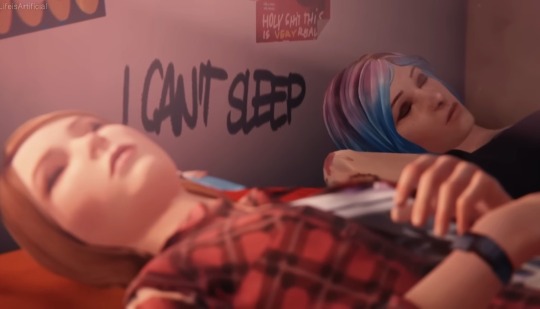
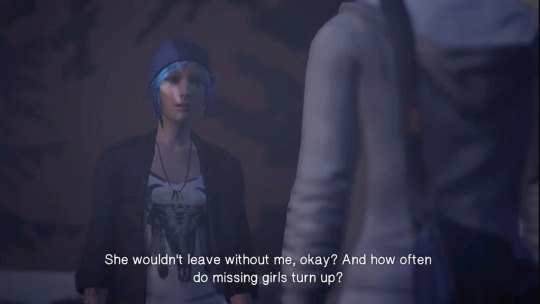
I got into Amberprice because of the amount of chemistry they have, the mutual attraction they have towards each other and how they always have each others' back despite being in darkness themselves -- they're each other's angel and it's definitely touching. Sharing clothes and stuff freely and crashing each others' places? Cute. Mentioning the other around other friends often? Hella cute! There are also multiple elements of surprise, like you'd think a rebel like Chloe wouldn't care for a perfect student like Rachel, who instead turned out to have a wild side, and Chloe turned out to be a softie on the inside. Stuff like these makes their chemistry much better than generic straight relationships I've seen in the media growing up. And the fact that Chloe still held the belief that Rachel wouldn't leave without her after all that she's gone through, definitely says something. Rachel was very genuine with leaving town together. Also true love on this end.
On the other side of the coin though, I really wished they had communicated better, the both of them. (It's a pity they were too young and without guidance to navigate all these) Yes Rachel I know you care about Chloe's feelings and wanna protect her, but being honest and open can go a long way. Chloe could've better regulated her emotions and how she comes across, such that she'd not come off as pushy or react as negatively e.g. give Rachel "the stinkeye"; if they worked on themselves and are actually allowed to improve, a healthier relationship would've blossomed. I also felt like there wasn't anything holding them back from them doing overboard with doing wild things together, like drugs and weed. They kinda spur each other on without the voice of reason or given the chance to mature after getting out of arcadia.
These AP shots come from Life is Strange: Rachel's story "the diner" ep, which gave me new insights on some of the nuances that could've been present in their dynamics. Pretty well-made given its constraints!
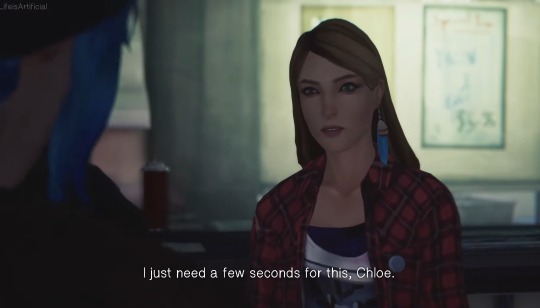
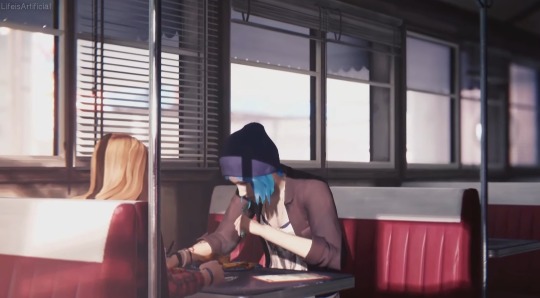
As always I can't say too much about Pricefield cuz I've not seen all their interactions, so I can only make individual comments. Take them with a pinch of salt!
On the good side Chloe's enduring love is always impressive, like remembering Max's birthday after all those years and immediately gifting her William's camera and taking her back. Moments where she emoted and expressed her appreciation with Max felt really genuine and I like how she's really supportive of Max, lifting the latter's confidence when Max was insecure, not to mention standing up for her in front of Nathan, David, Joyce etc. Very wholesome. On the other hand Chloe could've better nuance the manners of her speech, especially when she's angry -- Max is helping her so much after just reconnecting her for 5 years, it's not really an obligation and so I think she could've held back on some of her words at Max, which still comes down to emotional regulation, but I also understand that she was going through really tough times. I also didn't particularly like how she'd only change her wallpaper to Max after Max followed her wishes, even though that's not super abnormal for an 18 yo.
Max the sweetheart is honestly endearing when she doesn't hold back on positive words for Chloe, and when Chloe's off-balance she'd also be able to provide the voice of reason to put them on the right path. It's giving secure attachment style-- except the bad texter part. I just wish she'd stand up to Chloe a little more to avoid getting them into even more trouble, but that's just a personal take. My main issue with Max is her not writing to Chloe as much in those 5 years, but friends grow apart and it's only natural. As with DE, we'd have to take into the account of survivor's guilt and that nothing last forever, so if they ever separate, it is also understandable and inevitable in life.
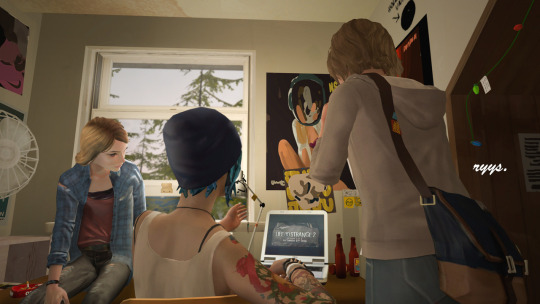
The OG did a good job on developing Max and Chloe's bond, and it makes sense why so many ship Pricefield, which I'm not against :) hope my slightly rushed response has answered your question pal! And as always, thank you for asking <3
#life is strange#amberprice#pricefield#rachel amber#lis#lis bts#chloe price#max caufield#lis: before the storm#life is strange: rachel's story#life is strange before the storm#lis: bts#lgbtq+#max and chloe and rachel#max and chloe#rachel and chloe#chloe x rachel#chloe x max#chloe x max x rachel#amberpricefield#奇异人生#personal take#lifeisstrange
37 notes
·
View notes
Note
hey! just wanted to say sorry for all the spam, i'm so so *SO* deeply in love with all your art and ideas, specifically your gaster art at this moment, they really scratch a specific itch i had about how i've always imagined this wet cat of a man!!! (that i never could have imagined before deltarune haha)
im also so curious on your ideas on dess and him.... i think you've won me over on this speculation and idea. It would be genuinely heartbreaking how it'd portray gaster as someone asking eldritch powers (us, players, in a maze he created for us to go through, hence no choices matter) in a last ditch attempt to save Dess from being gone, if i got it right from looking from some of your posts, with the nuance that wingdings loved them... if you have any posts detailing more of your thoughts on it, id love to see it! Be it ut or dr centric, no matter
thank you for posting your creations on tumblr too, have a good day or night! :)
I always appreciate notes-spam! It’s especially nice seeing someone enjoy the dess-gaster posting.
Aside from one-off ephemera here and there, I don’t know if i have much in the way of posts really detailing my current ideas about the dess-gaster situation. i DO have many, many thoughts about it, but the amount of unknowns and potentials right now make it difficult to organize those thoughts or talk about them coherently. there's also the issue of how much variation there is in the theory/headcanon game currently, and i worry about my ideas being confused for or conflated with something sinister. It’s a tough needle to thread sometimes... to a certain degree i’m biding my time to see if ch. 3-4 have any further information to give that might clarify or change things (Little Brother gaster… toby please…).
But i do have a general fanfiction concept that i tend to favor – the basic assumptions are that gaster originates in deltarune’s world, like sans & probably papyrus do, and ended up stuck with them in undertale, and that he’s a skelebro, specifically the middle or youngest. These are both ideas that i think have reasonable basis and could slot easily into the story as we currently know it. These open up possibilities for him to have some kind of in-universe history with dess as a relatively “normal” person around her age (whatever that could possibly look like), and i think there’s an outline of a story that can naturally evolve from there – basically, a youthful infatuation and a naive promise to her that, over time (and across narrative universes), becomes sort of a desperate, gnawing obsession with fulfilling that promise. The line between “love” and “sickness” seems relevant to deltarune’s thematics, in a possible inversion of undertale’s No Mercy, and i think gaster could be synecdochal for that tension. the promise, and his dedication to it, are motivated by love, and he’s Determined to fulfill it by any means, but the hurdles become harder and harder to overcome, and the deeper he gets into it, the more it isolates him and causes him to forsake his own future – he can’t move on or live his own life until he succeeds, he can't love anyone else or imagine a future without her – and that’s ultimately literalized in him effectively becoming a ghost, unable to interact with anyone else in a meaningful way, stuck "with her" in a parallel fate and yet unable to even have a future with her, his continued existence now entirely predicated on his pursuit of that mission. if he does succeed, and loses the need for his Determination, will he just... die? I think that’s sort of the thought underlying the noelle and gaster conversation – to what degree is this about love, and to what degree is it about death? they aren't necessarily mutually exclusive. It’s deeply sad and very messy, to say the least, but i think there’s a core to it that’s sincere, and vulnerable, and honest. there's a beating heart under it all. it's broken, it aches, it should be impossible for it to beat at all, and somehow it still does.
and it's harder to talk about dess because we haven't even met her, but we know she's protective, maybe self-sacrificing in her own way. sometimes i wonder if she's trying to stop him, antagonize him until he gives up, not because she hates him or doesn't value her own future, but because she doesn’t want help if This is what it requires – putting noelle and kris and everyone else at risk, and, even aside from that, seeing her friend destroy himself for her sake. I think about them meeting again, and she’s like, “why can’t you just let this go? i'm the reason for this, and i don't even get a choice? i never wanted you to do this.” and all he can say honestly is “i couldn’t have lived with myself if i didn't. I can’t even die knowing that you’re stuck here, no matter how much i want to.” and like. both things would be true. I’m fascinated by it
10 notes
·
View notes
Text
(Sorry for this being a long post, it became a rant/vent and a lot of thoughts. Someday I'll shut up about this I SWEAR lol. There's a TL;DR at the end.)
Maybe I'm not even interested in syscourse outside of learning more about plurality and its connections outside of CDDs and why someone may see themselves as plural or really any way of not seeing oneself as One Singular Self (whether it has to do with a disorder or it's a cultural/religious/etc. reason). Or I guess that does make me interested in syscourse. Just not echo chamber syscourse.
Like I'm sorry but y'all are fucking mean. I LOVE having discussions where I can learn and understand other perspectives. I guess to steal SAS's label, I'm very pro-syscourse conversation (though—and this isn't to bash SAS AT ALL—to me that feels redundant because syscourse is supposed to be conversation anyway. But it's not so the label is necessary). I want to learn. I want to be educated. I want to discuss this, even with people who disagree with me, because I want knowledge of other perspectives.
But it is so hard to find syscourse spaces that AREN'T echo chamber syscourse spaces. The desire to attain knowledge is stomped out by attaching inherent morality to labels that can be boiled down to one argument: Do you or do you not believe that plurality is exclusive to CDDs?
And shockingly this has more nuance than "endos are/n't valid". What may cause someone to see themselves as plural without a CDD? And the answers are vast and could be a FASCINATING discussion. Not even necessarily a debate, just learning more about people. And yet the answer to this question isn't even considered before so many people just go "[extremely loud incorrect buzzer noise]" and shut it down.
Maybe, ironically, this is me struggling to understand perspective. But I don't understand the lack of interest in wanting to understand, despite having experienced it myself. And even that, I want to understand. But I know that the fact that because of the nature of my opinions, I would be marked pro-endo, and shut out of that discussion. And it's INFURIATING because I respect the fact that they don't want to interact with me but I just don't understand!
There is endless room for discussion that's shut out and it's frustrating. It's heartbreaking. I want there to be discussion. But there won't be until the echo chambers start to open their fucking eyes.
I remember the moment for me was when someone in the Twitter dissociatwt community who I really respected, who always provided good resources, who was reliable and kind and honest...was pro-syscourse conversation. And my knee-jerk reaction was almost betrayal. How could someone that I respected be a pro-endo??
But I realized that they didn't stop being reliable because of this. Some of y'all will discount doctors who have been studying plurality, trauma, and dissociation longer than some of you have been alive because they're a stinky smelly "pro-endo". Therapists and doctors and the like who go "Why isn't it possible" get discounted because of this when they, too, just want to understand. Because with all due respect and in the most positive way, they're a bunch of nerds. And I don't understand. I don't understand how you can do that.
And that's really the thing. I don't understand and I'm not given the space to understand because my stance is somehow morally wrong. I'm not virtue signaling right. Sometimes for both sides. And it's awful.
TL;DR, I don't understand and am frustrated by echo chamber syscourse. That's it. That's all this long-ass post is saying. I don't get it. It didn't need a post but a lot of me just started Talking and did not stop.
36 notes
·
View notes
Note
Hi! I wanted to thank you for the post and you @mengyan made about names and titles for Fangs of Fortune! It's a great post and I reference it a lot.
I was also wondering if you had any resources for (or wanted to talk about) how Mandarin names in pinyin work in a modern setting. For example, I think it would be appropriate for a friend to call Pei Sijing just "Sijing" but Wen Xiao would have to be "Wen Xiao" because there aren't two syllables in her personal name but I'm having trouble finding resources i trust, especially on appropriate forms of address in different types of social settings or levels of formality in China today. I'm linguistically ignorant but curious and since I liked your first post so much, I thought I would ask you.
If talking about this doesn't interest you, then please don't be bothered by this ask! Thank you both, again, for the the post you already made.
hello! i'm so glad to know that post has been helpful to you; calamity and i both looked at the sheer variety of names the main cast used for each other and were like "hey is anyone else gonna try and organize this?" and so we did!
thankfully, and also probably expectedly, mandarin naming conventions are far more relaxed now in the majority of social settings, so you won't need to worry about anyone slinging around terms like gongzi or daren lmao. unfortunately i personally don't have any comprehensive guides on hand, and i think it'd be very difficult to try and encapsulate all the nuances of chinese addresses when much of it depends heavily on the people and also region (north vs south, different provinces), so i can only give a basic rundown of some stuff! obligatory FYI to take these with a grain of salt because other mandarin-speakers might disagree with me based on their own experiences. gonna try and be as general as possible!
between friends, naming is generally very lax; people can use each other's full names, given names, or nicknames (or a combination of all). the usage really depends on the character and how formal you think they'd be. an age difference also doesn't necessarily mean one of them calls the other one jiejie or gege bc that also depends on the relationship! for example, in canon zyc already calls wx just "wen xiao" despite being younger than her. you can make him call her "jie" in an au, but ultimately that's up to you! pretty much all the names/nicknames the fof squad use for each other are all still usable in a modern setting because their naming habits dictate their relationships with each other (e.g. zyc would definitely full-name zhao yuanzhou regardless of age and wen xiao can still use "pei jiejie" flirtatiously)
between acquaintances it's really the same thing; using full names or given names still goes! as for addressing strangers in your generation, using full names is the safest bet, or—if you don't know their name—politely casual terms of address like "da ge" (big bro) or "xiao gege/didi/jiejie/meimei".
again, a lot of it actually really boils down to the individual. e.g. for me i don't mind if someone i met very recently starts referring to me with only my given name instead of my full chinese name, but my grandmother almost exclusively refers to me by my full name even though we're very close bc that's what she does with everyone. my cousin only calls me "jiejie", and i only call her by her nickname, bc our relationship is very casual and i've never had a reason to full-name her. also sometimes using someone's full name just flows better than using only their given name LOL.
i don't think you need to worry a lot! most of the basic guides from google searches are safe to follow, like this one and this one.
if you want to get a really solid grip on how mandarin speakers refer to each other casually vs formally with age hierarchy also being taken into consideration, and have any free time or interest, i actually recommend just either 1) watching/reading more modern chinese stuff, or 2) watching variety shows like hello saturday (their fof cast episode is here) or traveling shows (zyz and zyc's actors were on this one; zyc and psj's actors were on this one), where industry people from all different age ranges interact with each other, some of them friends and some of them not. nothing better than experiencing it with your own eyes and ears!
just realized how long this is oh my god. this is as much as i can summarize, but if you have any specific questions regarding fof characters in a modern universe, you're free to dm me or send another inbox ask! hope my response and/or recommendations were of help :)
16 notes
·
View notes
Text
The writing blindspots in Infinity Train with respect to race
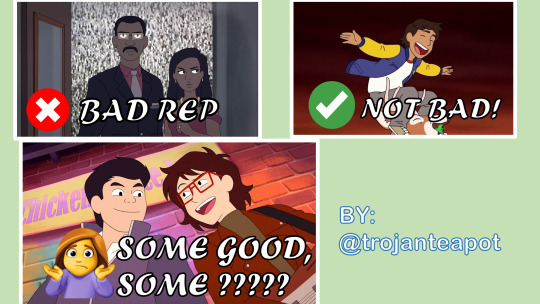
To get this out of the way, I love Infinity Train! It’s one of my favourite shows! I started writing fanfiction because of this show, and it still inspires me every day.
I really do think that Infinity Train as a whole is a very thought provoking children’s show and I applaud it for exploring darker themes relevant to psychology and psychological well-being, which are topics often overlooked not just in children’s media but for adult media as well. However, I do want people to acknowledge some of its shortcomings, especially because it is a show that is dealing with such heavy and complex topics, and also positions its human characters as coming from a world which is pretty much a stand-in for our own.
Now I know that the storyboard artists for Infinity Train were quite diverse, but I don’t really know if it’s the same for the writer's room. The reason why is that as a POC viewer, it really does seem obvious to me from the way that the POC characters were written pre-season 4, that their race was mostly an afterthought.
Okay and to be perfectly clear, this is NOT A BAD THING. This is just a neutral thing. Obviously we don’t need every single story with POC characters to have to be about their experience as a specific racialized person. There are experiences that are shared among everybody no matter what race they are. I am not saying that you need to do super in-depth research into every single cultural nuance of every ethnic minority before writing them. It depends on if you really want to delve into how their heritage or traditions or specific life experiences inform their character arc. Not every character arc is about that. And it shouldn’t be!
With that being said, I do think that perhaps the writers should have tried to consider asking themselves very basic surface level questions on how being non-white would inform the problems and conflicts their characters would face. They don't need to know the ins and outs of each culture for each of their characters, but they could have just asked “How would I feel/react to others if people made weird assumptions about me based on my race? How differently would my parents raise me if they were afraid of prejudice or discrimination?” I think they should have reflected on that before setting in stone the backstories for their POC characters, especially with respect to Grace.
Part 1: GRACE'S PARENTS
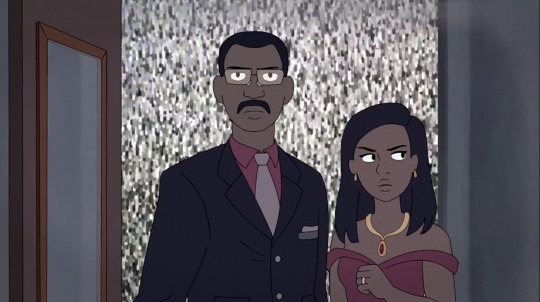
So I am not Black myself, but I have had many conversations about Grace with one of my friends in fandom who is Black, and we both do get the sense that Grace’s race was very much just an afterthought to her characterization. To be clear, this is NOT because she has very wealthy parents. I am well aware that there are Black Americans with generational wealth. However, knowing what we know about affluent Black people in the real world, how Grace’s parents treated her makes absolutely no sense.
For example, among extremely wealthy people of any race, networking and knowing the right people is of the utmost importance. This is why so many rich people send their kids to prestigious private schools so their kids can get a heads start on knowing the progeny of other one-percenters. If you look up famous people with famous kids, chances are you’ll see a list of all of the very exclusive private academies that they all went to (looking at you, The Strokes). This is the case for wealthy people of all backgrounds, not just white people. And honestly, I imagine that the pressure is at least double for the kids of wealthy POC parents to get to know the right people as early as possible to be able to open as many doors as possible, in order to mitigate the inherent disadvantage of being a racialized person.
But what did Grace’s parents do? According to her, they never sent her to school of any kind, only having private tutors teach her, and her ballet instructor only made her join the other kids in her class once for a recital or something? This is, for lack of a better term... buck wild.
In addition, her parents are American diplomats. Diplomacy is an extremely people-oriented position. If anything, her parents would want her to not only be in the best private school, but to be the best student in school, to know the best people, to join the school clubs that all the other diplomats’ kids are in, and train her from a young age to be a social butterfly. Yes I know that diplomats will often leave their home country and be stationed somewhere else for long durations, and yes their kids could be taken out of school then, but some diplomats just enroll them in a different institution in the visiting country, or not take them out of school at all. This is what the IB Program was invented for, actually. Her parents being diplomats does not justify never enrolling Grace in school. In fact, it makes it less justifiable.
The fact that they did the extreme opposite of that is so illogical to me that I wonder if perhaps the writers just cobbled together a whole bunch of tropes that they think apply to rich people without actually checking if any of it makes sense, doubly so for rich people who are non-white.
I think the reason why is because they wanted Grace’s parents to stifle her growth and her natural social skills, but on the Train, she can be who she truly is. I definitely agree that Grace finding herself and being able to truly blossom into the girlboss she is on the Train is a great plot point from a characterization perspective. However, I do not think that it should be because she was being stifled by her parents. The solution is staring the writers right in their face, but they can’t see it because it’s a blindspot for them.
What they should have gone with is: Grace's inability to become a social butterfly and a queen bee in her daily life is because she is a dark-skinned Black girl!!!
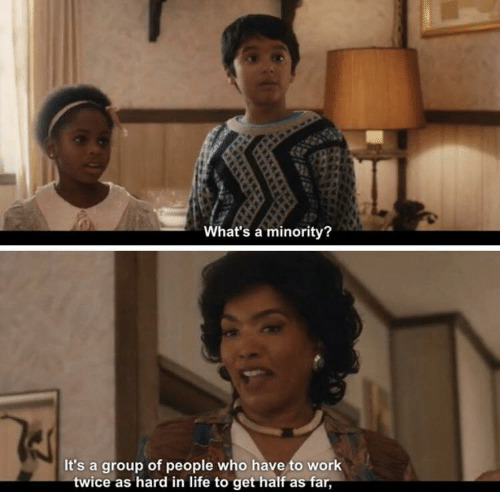
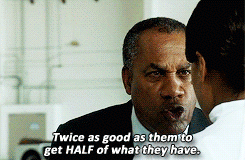
Her parents have extremely high expectations for her socially. They could have pushed her to make friends with kids she didn’t like just because they wanted to be on better terms with their parents for networking or diplomacy purposes – which they could have shown with that one girl from her ballet class. Missed opportunity! But no matter how hard Grace tries, she will never be seen as the perfect girl because of other people’s assumptions about her just based on her race.
Once she’s on the Train, Grace then uses her people skills and finds that they’re a lot more effective there, because it’s no longer Earth’s society, it’s a different world, literally! Plus this even allows her to be a little bit more mean, a little bit more honest, something she wouldn’t be able to get away with in the real world without being punished for it harder than her white peers. We already see hints of this with how she interacts with Simon, a white guy who is the same age as her.
CAVEAT: The dialogue where Grace reveals that she never went to school was something that she told Hazel in a private conversation. So it could be that she did go to school, but lied about it to seem more relatable to Hazel, who had never been around other kids before. Lying is in character for Grace because she would pretty much do anything to get on somebody’s good side. But the way that they had her voice actress deliver those lines, and the way that her expression changes when she talks about how lonely she was indicates that she was telling the truth. To be charitable, I suppose we can land on the reading that Grace told Hazel a half-truth. She did go to school, but she was frequently taken out of class or skipped semesters because of her parents’ jobs as diplomats. So her loneliness in that instant is at the very least truthful. Your mileage is going to vary on this interpretation of course.
This points to a weakness that I can sort of see in Infinity Train in general, where they push societal problems into purely the realm of personal failings. “It’s not because of society that Grace couldn’t succeed, it was solely due to her abusive parents” being just one example.
Never forget this monologue from a Black father to his daughter in Scandal:
youtube
Part 2: JESSE'S ARC WAS PRETTY GOOD THOUGH

The thing is they actually did write a POC character having to deal with a problem that was society-oriented quite well, at least in my view. Although, I am still pretty sure it was still coming from a race-blind method of writing the characters. Otherwise I feel like Jesse’s status as an Indigenous American would have come up more than a grand total of one time. That they could do this well for Jesse makes the fact that they didn’t do the same for Grace quite disappointing.
Jesse’s main issue that he had to overcome was he kept caving to peer pressure and had trouble saying no to others for fear of disappointment. Now, this problem is universal, and it’s not solely something that is specific to Jesse’s race or ethnicity or cultural background. In fact, I am quite certain that they wrote Jesse as a character without even considering that this problem he faces is relatable to POC experiences. But I definitely know a lot of POC in my life who do take on more responsibilities than they can manage, or feel a higher pressure to fit in with their peers. Hell, I’m that POC in many cases! It’s kind of like background radiation to us as minorities that we just have to do more emotional labour in order to be seen as equals. That’s just the reality of the situation. You can understand and relate to Jesse’s problem without being Indigenous/Native American, but at the same time it feels like a natural problem for him to have, because he is non-white!
I will admit that a personal blind spot of mine is I don't know and haven't had the chance to speak to too many Indigenous people, so there could be aspects of Jesse's arc that don't really make sense. If you are somebody who knows more than me, please feel free to correct me! I would love to hear how you felt about Jesse's characterization and arc as an Indigenous person!
Part 3: SEASON 4, THE ASIANS
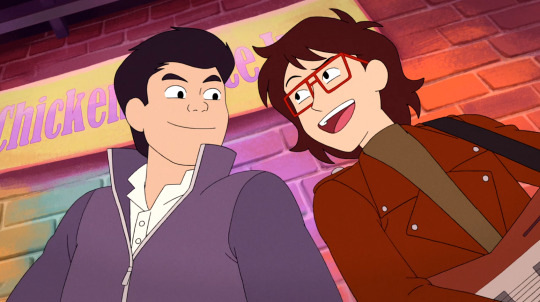
Alright now it's time to tackle stuff that I actually could have any ounce of authority talking about? Which is how they wrote Ryan and Min-Gi in Book 4. I myself am Asian-Canadian. Specifically, I am a first generation Chinese-Canadian but I've been in Canada since I was six so I find a lot of the experiences of second generation Asian-Canadians more relatable to me. In addition, my partner is fourth generation Japanese-Canadian, so his dad would be the same generation as Ryan's dad. (I also am really really into rock music, but that's besides the point.)
What they got right:
So first off, I could tell that they really did consult Asian people in writing this season, so good on them! The difference in how Ryan’s parents raised him in contrast to Min-Gi’s parents felt very natural and realistic to me. Ryan’s family is more westernized and has assimilated more into broader Canadian culture.
The fact that Ryan has an English name and not a Japanese name immediately shows that. Min-Gi’s parents not choosing an English name for him is a bit of a surprise; very few Asian immigrants go without an English name back in the 20th century. Even nowadays it’s extremely common for us to go by English or Western names that we, or our parents chose, instead of names in our native language. But there are good reasons to not choose an English name. Perhaps Min-Gi’s parents wanted him to have a closer tie to his Korean roots, or perhaps if they travelled back to Korea to visit family it would be easier for them.
Also, Min-Gi’s parents not supporting his dream of becoming a musician and want him to get a stable job in… I think it was finance? Definitely true back then as it is today. I’m not entirely sure how Ryan’s parents feel about his life choices, and we’ll get into that later.
The character arcs for Ryan and Min-Gi are excellent. This dichotomy of wanting to do the good, responsible thing that your parents want for you because they want you to have the best chance at a good life, and doing what your heart tells you to do, is an extremely relevant character arc. It’s a life decision that is not just an Asian thing, but something anybody can relate to. However, in East Asian cultures that were generally influenced by Confucianism, which includes both Korean and Japanese culture, upholding your duty as a child to not disappoint your parents in any way is something that Asian cultures are prone to emphasizing to a great degree. We see this in other media centered on the Asian immigrant experience as well, such as Kim’s Convenience, Turning Red, and Everything Everywhere All At Once.
What was a bit puzzling to me:
So I'll start off with the thing that definitely raised many many eyebrows if you were an East Asian or Southeast Asian watching the show: Why were Min-Gi's parents so friendly with Ryan's parents when they're Korean and Ryan's family is Japanese?!
So like, not to bring politics into it but… World War II happened. It affected, you know, the world and stuff. And in the Pacific Theatre (god I hate that term), the Imperial Japanese Army… invaded Korea?? Among many other countries??? And did a bunch of war crimes?????
Like, Japan was invading other countries well before WWII even started… This is common knowledge… for Asian people that is.
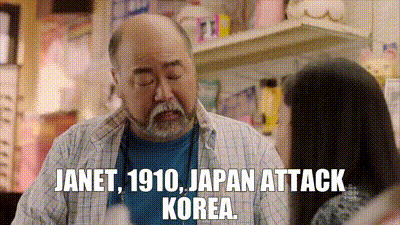
Yeah I know what you're gonna say. “But Ryan's family is Japanese-Canadian!! They wouldn't have done those war crimes! They would have been sent to internment camps!” Yeah dude, I know! My partner is Japanese-Canadian, remember?! And even if I didn't know him, we learned about the internment camps in history class. It's pretty common knowledge among progressives in Canada and the US. George Takei did a whole musical about it.
But that's not how racism works. I can speak from personal experience that the scars of WWII trauma in Chinese and Korean communities run deep. Even my own parents needed a bit of convincing to be okay with me dating my partner, and my parents were born two decades after WWII ended. My partner said that one time when he and his grandmother got into an elevator with an elderly Korean woman, and at first she was friendly, but once she realized they were of Japanese descent, the elevator ride became deathly silent afterwards.

So when you have Min-Gi’s parents, who were probably born during or slightly after WWII, immigrate to Canada, and then be like… totally okay and hunky dory pals with Ryan’s parents just because their kids were born the same day in the same hospital…? I mean sure, anything can happen. But it definitely speaks to how abnormally accepting, forgiving, and welcoming Min-Gi’s parents are.
To be clear, this isn’t something that pulled me out of the experience, personally. Yes, it is strange, but it’s not impossible for a Korean family to be super okay and friends with a Japanese family. Maybe it’s because their small town has very few Asians and so they have to stick together due to solidarity or something. Maybe Min-Gi’s parents are the type of Christians that believe in the inherent goodness of everyone and giving everyone a chance. Maybe they are just extremely progressive and see Ryan’s family as Canadian more than Japanese (highly unlikely), or they know about the internment camps and that was enough to get over their biases toward them (also unlikely). I dunno, anything can happen.
The other thing that bugged me was that they really didn’t explore Ryan’s relationship with his family to the same depth as Min-Gi’s relationship with his family.
They already set up the contrast of like, you have an immigrant who is more connected to their cultural background, and a third generation descendent who is less connected, and more alienated from his cultural background. That kind of stuff can really weigh on you as somebody who is a minority. You feel like you simultaneously aren’t Canadian enough because you aren’t white, and that you’re not enough of your cultural background because you had to assimilate, or were forced to assimilate.
Yes it makes sense why Ryan would throw himself into his music, and be disconnected from his family. But they didn’t take the time to really explore why he is that way. Ryan barely talks about his family except randomly mentioning that they don’t care what he does with his life. I don’t even know if that really makes sense that they don’t care what he does? Maybe Ryan thinks they don’t care, but his assumption is wrong? Either way they don’t explore this point that much. Even if his parents were more assimilated they would still care if Ryan had a non-standard job, such as being a musician. There is a gap between Ryan and his family/parents that was alluded to, but not explored. Feeling like you come from two worlds but not neatly fitting into either is so quintessential to the immigrant experience of Canadians (and also Americans) it’s a shame they only paid lip service to it.
I mentioned in a different post that Ryan would be monolingual while Min-Gi would be bilingual, and how this could cause tension between them. I imagine Ryan definitely feels inferior to Min-Gi in that sense of loss and disconnect with his heritage, just as Min-Gi is jealous that he feels he doesn't have the freedom to pursue his musical career in the same way that Ryan can. This is all stuff that can take a psychological toll on people, and is something which the Train as a metaphor for therapy should have been primed to tackle. But unfortunately we didn't really get that.
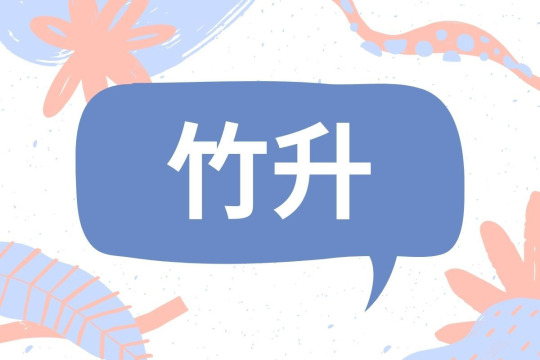
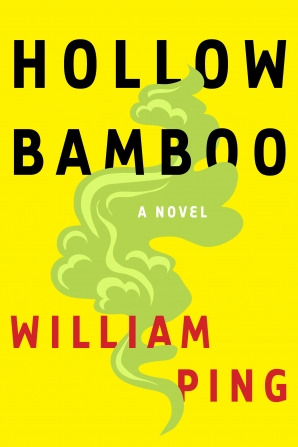
There is a term among the Chinese Diaspora known as “Hollow Bamboo (竹杠)” or “Rising Bamboo (竹升)” [more info]. It's an insult tossed at kids of Chinese ethnicity from judgemental adults for being unable to read/write Chinese or who cannot speak Mandarin/Cantonese/other Chinese languages fluently because they've been “too westernized”. They say we “look Chinese, but are hollow inside, like bamboo.” I don't know if there are equivalent terms for other Asian diaspora/immigrant communities but there must be. This term is controversial, and in my own opinion very unfair, because it blames the kids for this loss of cultural identity when there are so many different factors at play that makes them lose it, all of them outside of their own control.
Again, I think this is a blindspot from the writers just not understanding how much this loss of cultural identity is such an integral part of the experience of being an immigrant, and that it's not only felt in first or second generation Asian-Canadians, but also third or fourth generation, and beyond. It's scary to go out there and redefine what your culture means to you, and how to pass it on to the next generation.
CONCLUSION
So there you have it, a summary of the strengths and the weaknesses in Infinity Train as it pertains to writing about racialized characters. Just want to restate that a lot of what I pointed out is pretty minor in the grand scheme of things and I do overall think the writing is solid. I am not going into this to say that I expected the writers to do a good job, because generally my expectations for media and pop culture to portray POCs respectfully is quite low. At least they didn’t fall back on tired stereotypes, which is a low bar to clear, but it is where the bar still is these days.
If on the off chance Infinity Train does get uncancelled and renewed for more seasons, I hope they take these lessons and craft better narratives for their POC characters. Maybe hire some more non-white writers while you’re at it!
#infinity train#infinity train book 2#infinity train book 3#infinity train book 4#infinity train book two#infinity train book three#infinity train book four#writing poc#writing black people#writing asian people#writing indigenous people#poc representation#black representation#asian representation#indigenous representation#grace monroe#jesse cosay#ryan akagi#min gi park#rymin#analysis#character analysis#media analysis#cultural identity#olivia pope#rowan pope#immigrant parents#long post#raceblind writing
91 notes
·
View notes
Note
What's your thought on those who called Vision 'abusive' to Wanda?
It's, well, silly, and more than it's silly, it undermines so much of Wanda's character and her history that I feel like it's an opinion fundamentally exclusive to being a fan of hers. It's more than understandable to not like the relationship, to not be a fan, to find it annoying or overblown or what have you, but the core of their relationship NEEDS to be love for the dissolving of their marriage to mean something. For their children to mean something. It was through her love for Vision and their mutual desire to make a family that the twins were born, and it was Vision being essentially a walking corpse, a shell of who they once were, that made the loss of the twins all the more difficult to deal with, because there was nobody who could share her grief with her properly, who could support and understand her. If Vision was abusive, the narrative and the tragedy completely changes, and I have no idea why anybody would want to change that when it undermines so much of the story there.
I feel similarly to people who call Pietro abusive to Wanda. He is often messy, and toxic, and can be cruel, but to frame their relationship with that kind of power dynamic is ahistorical and does them both a massive disservice. He isn't always a good brother, but he does ultimately love her and does want good things for her, even if he does equally have an issue of projecting his own feelings onto what he thinks is right for her. But his love for her is ultimately what always overcomes this, and to disregard that complexity and nuance into "Pietro is only ever a bad brother and is abusive to Wanda and is the reason for all the bad things in her life" is ridiculous! And very Watsonian, as most of the bad things in Wanda's life are John Byrne and Brian Michael Bendis.
Not every relationship that can be toxic is abusive, and calling it that does not empower Wanda in anyway, it makes some of her most important and meaningful relationships have a completely different context and meaning and I don't know why you would want that for her. If you cannot accept the reality of her relationships with Vision and other characters... you should probably read something else, I dunno.
15 notes
·
View notes